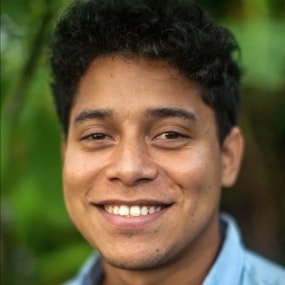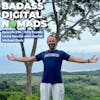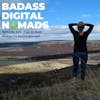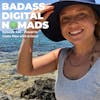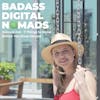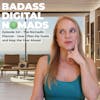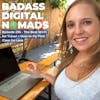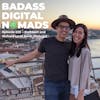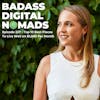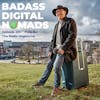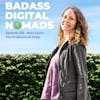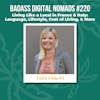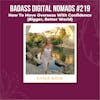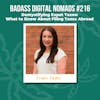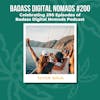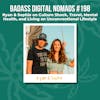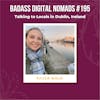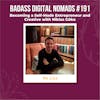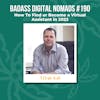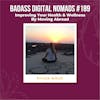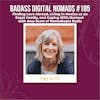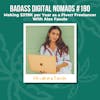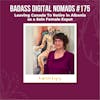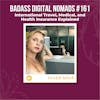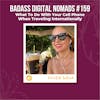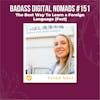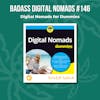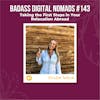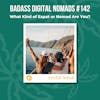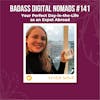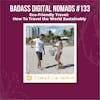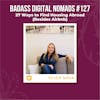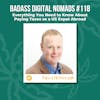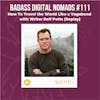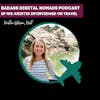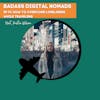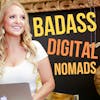Getting Paid To Travel Full-Time as a Digital Nomad YouTuber
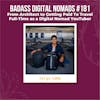
Failing as an architect led Sergio Sala to become a freelance web designer and move from Mexico to Peru to save money. A few years later, he's getting paid a full-time salary to travel the world as a digital nomad YouTuber. In this podcast, he shares how he does it and how you can, too.
Failing as an architect led Sergio Sala to become a freelance web designer and move from Mexico to Peru to save money. A few years later, he's getting paid a full-time salary to travel the world as a digital nomad YouTuber. In this podcast, he shares the different ways he's earning an online income through different revenue streams.
Sergio also highlights his favorite places to live, why he moved to China to learn kung fu, and how he adapts to foreign cultures while traveling the world. To read Sergio’s full story, pick up a copy of Digital Nomads for Dummies in-store and online now!
Episode 181 Special Offers:
- Take Kristin’s Freelance to Freedom Online Course
- Buy Digital Nomads for Dummies
- Subscribe to Kristin's weekly newsletter
...........................................................................................
Connect with Kristin:
- Follow on Instagram
- Subscribe to Traveling with Kristin on YouTube
- Join the Badass Digital Nomads Facebook Group
...........................................................................................
Support the Badass Digital Nomads Podcast:
- Buy Kristin a Coffee
- Become a Patron
- Leave a 5-Star Review
- Buy Official Merch
- www.badassdigitalnomads.com
...........................................................................................
EPISODE 181 TOPICS DISCUSSED/WHAT YOU’LL LEARN:
- How studying abroad changed Sergio’s life.
- Why his architecture business failed
- How he got started in freelance web design.
- Traveling the world as a freelancer and blogger.
- Connecting with people and cultivating community online vs. in person.
- Advantages of being location independent.
- How to start making money online.
- Countries with low cost of living & Sergio’s most affordable destination.
- Why he went to China to live in a temple, shave his head, and learn kung fu.
- The significance of repatriation in the modern age.
- Why he switched from a Spanish-speaking audience to English-speaking.
- Ways to make money from creating YouTube videos.
- Sergio’s Digital Nomad Cities guide on YouTube.
QUESTIONS ANSWERED:
- How do you connect with other digital nomads and online creators?
- How many freelance clients do you need to make a living?
- Why did you move to Peru when you first became a digital nomad?
- Why did you start a YouTube channel?
- What did you learn about yourself after living in China for a month?
- How do you make money as a full-time YouTuber?
- And more!
RESOURCES
Resources for Digital Nomads:
- Coworking Space in Playa Del Carmen: Nest Coworking
- Global Youth Leadership Program: AIESEC
- Global Community: Nomad List
Related Books:
Related Podcasts:
- Tulum, Mexico Digital Nomad Lifestyle – Does It Live Up to the Hype?
- Inside the Real Bangkok, Thailand with Erick Prince, The Minority Nomad (Part 1)
- How To Make Thousands of Dollars per Month Writing on Medium
- Being a Digital Nomad in Southeast Asia With Giang Cao From Vietnam
- How To Change Careers and Find Community Anywhere in the World With Patrick Farrell
Related Videos:
- Sergio’s Digital Nomad Cities Guide
- Living in Tulum, Mexico as a digital nomad
- How to Make Money Online and Find Remote Jobs (Playlist)
- 10 Ways I Make Money Online - My Top Ten Online Income Streams
- How To Make Money Online Fast 🚀
...........................................................................................
Connect with Sergio:
Podcast descriptions may contain affiliate links of products and services we use and recommend at no additional cost to you.
Freelance To Freedom Course
Do you want to earn an online income or start a side hustle but have no idea where to start or don't know what skills you have that will translate to making money online? My online course, Freelance To Freedom provides a step-by-step system to help you create unlimited time and location freedom using the skillset you already have. This course is for you. If you have some work experience and you want to be able to start earning an online income as a freelancer consultant, or offering professional services, you can sign up today and take the course at your own pace at digitalnomadbootcamp.com or by going to the link in the show notes. Check it out at digitalnomadbootcamp.com.
Introduction: Welcome to Badass Digital Nomads, where we're pushing the boundaries of remote work and travel, all while staying grounded with a little bit of old school philosophy, self-development, and business advice from our guests.
Kristin Wilson, Host: 00:01:11 Hey there, Kristin, from Traveling with Kristin and welcome to episode 167 of Badass Digital Nomads. My guest today is Sergio Sala, a digital nomad from Mexico who is now a full-time digital nomad YouTuber. I love this conversation with Sergio where he is explaining to us exactly how he went from a traditional lifestyle, born and raised in Mexico through to becoming a freelancer, then an online freelancer, becoming a digital nomad as far back as 2014, and how he has been able to adapt his career and revenue streams over the years to ultimately become a full-time YouTuber and how he's making income from a lot of different sources except Google ads sense. So a lot of people assume that to make money online as a YouTuber, that your main source of income would be through YouTube ads, but that's actually not the case. So in today's episode, Sergio breaks things down and how he makes money online and how that allows him to continue traveling around the world.
Kristin: 00:02:26 He also shares some of his favorite places to live in Mexico, how he had his laptop stolen in Medellin, adapting to different cultures. And he also talks a bit about the different city guides that he makes for YouTube. So living as a digital nomad in different cities around the world. I really love this conversation with Sergio because it shows a perfect example of what the permissionless economy is. There was no one around him and his friends, family or network in Mexico who were telling him to start a business on his own or to become a digital nomad. But he started step by step and he did it anyway. That was also one of the things I loved about last week's conversation with Alex Falo. In case you missed it, she went from writing $5 blog posts on five with zero experience to becoming a fiverr millionaire.
Kristin: 00:03:28 And I just listened to her episode again last week and I even sent her a WhatsApp message telling her how much value I personally got out of our conversation and how much I enjoyed talking with her. So make sure to check that episode out if you missed it. And also let me know what you think about this and any other podcast episode. Last week in the Facebook group in Badass Digital Nomads, I posted about Alexandra's episode and Ted Respond and he said, as a quote word nerd, I'm currently researching, freelancing and seeking to learn what I can regarding editing, translating, and content creating, as well as the nuances of the business side. I'm picking up numerous helpful tidbits from this group. Grateful and quote, thanks Ted for joining the conversation and make sure to stay tuned to my YouTube channel because I have a video on freelancing and passive income side hustles coming out soon.
Kristin: 00:04:35 It's been about two years since I made a video about online income stream. So you definitely don't wanna miss that. I hope you enjoyed today's conversation with Sergio Sala and remember to check out a copy of Digital Nomads for Dummies to read his story in print. You can buy Digital Nomads for Dummies almost anywhere that books are sold. And there is also a direct link in the show notes. Enjoy.
Pocast Interview:
Kristin: Well, Welcome Sergio to Badass Digital Nomads. Been a long time that I've wanted to have you on the show, so I'm so excited that you're here today.
Sergio: 00:05:14 Thank you. Thank you for the invite, Kristin. I'm very excited too.
Kristin: 00:05:18 You're welcome. And where are you joining us from today? We gotta ask cuz you know this is the show of Travelers
Sergio: 00:05:25 <laugh>. Today I'm in San Cristobal de las Casas. It's a long name in Chiapas in the southern state of Mexico and it's actually very close to my hometown. I was all the way in Europe and I went to do some family stuff and I said, where, where should I go next? And this one is so close by, so I said let's do it. And that's why I'm here.
Kristin: 00:05:45 Oh, okay. So you were close to your hometown.
Sergio: 00:05:47 Yeah.
Kristin: 00:05:48 Well, you've spent a lot of time in Mexico because you're from Mexico, tell us a little bit about where you're from and where you grew up.
Sergio: 00:05:57 Yeah, I'm from Tabasco. <laugh> also. Every time I travel I tell people, you know, I'm from Tabasco, they're like, like the sauce. That's the first question that they ask me. You know, the capital is Villahermosa, That's what I was born. Tabasco, the sauce is actually from Louisiana cause people ask me all the time, but there's a chili called Tabasco, that's why they name it like that. And that's also in the southern part of Mexico, but not close to Playa Del Carmen and Cancun, it's like in the middle of that arch of the country and the state of Tabasco just below is Chiapas and that's where I am right now. It's like fire away by boss and born and raised there. But then I moved to other places. Maybe we can start talking about those things.
Kristin: 00:06:42 Yeah, well I knew a little bit about where you were from because I googled it when I asked you to be in my book in Digital Nomads for Dummies. And I was like, where is Tabasco? But I didn't even think about the hot sauce. But now that you mention it, yeah, I don't know. But it's a much bigger city than I had expected because for some reason I had never heard of it. I'd never been there. But it looks like quite a large city. So you had a pretty traditional childhood there and went to college to study architecture, correct?
Sergio: 00:07:16 Yes. Well, the city Villahermosa, it's a medium size city. Yeah, it's big. It's almost a million something people there. I don't know. I don't know the stats. I stopped counting.
Kristin: 00:07:25 Oh, so Tabasco, is that the state?
Sergio: 00:07:27 Tabasco the state.
Kristin: 00:07:28 Okay.
Sergio: 00:07:29 Okay. The thing is the Mexico, not everybody, but a lot of Mexicans we tend to say the state cuz sometimes they're repetitive, let's say Pueblo. Pueblo, I know the, the city of Pueblo and Puebla or Oaxaca or Oaxaca. So it's kind of annoying to say that. So we tend to say the states, that's how we go.
Kristin: 00:07:45 Yeah, like Quintana Roo is the state of Playa del Carmen. Uh,
Sergio: 00:07:50 Playa, Cancun, Tulum
Kristin: 00:07:51 Cancun, yeah.
Sergio: 00:07:53 Yeah, I speak confusing then Riviera Maya which is all, all the parts and all that. But yeah, the state of Tabasco and the city of Villahermosa and that's the medium sized city. I grew up there just surrounded by Mexicans. Of course in my school I learned some English. So also people ask me how do I speak? Well I guess that help. And also playing video games, <laugh> and learning everything. You know, back then everything was in English. I was consuming a lot of English. That helped me. And then I moved to Puebla, Puebla, Puebla, you see what I'm saying? <laugh>.
Kristin: 00:08:28 Yeah,
Sergio: 00:08:29 <laugh>. And that's where I moved to school, to university to study architecture. Before that, I learned to build websites when I was 14 years old just because I love to play a video game called Pump It Up. It's a dance machine game that you play with your feet in the states they call it dance revolution. I played it so much that I decided to create a websites and I don't know why at 14 years old. And that brought me to what I'm doing today. But it's like a long, long story. And I did some projects here and there, but when I had to choose to Korea, I said no web design. Back then it was to study, you know, graphic design or uh, programming. And we were talking about 20 something years ago. So the world was very different. So I decided to study architecture with something a little bit different but not that much. Cause it was also creativity and designing and something like that. And I moved there and I loved it too. Like Pueblo's a beautiful city. People wants to visit such a beautiful place and that's what I love. Mexico. Mexico has so many great places to be visit, you know.
Kristin: 00:09:36 Yeah. It's so diverse and it's definitely a compliment to Mexico that you're from there and you're a digital nomad, but you keep going back there and exploring some of the different areas of Mexico. So we'll talk about that a bit. Yeah. Because you've done videos about what it's like to live in these places too, so people can check those out as well. So yeah, you graduated with your architecture degree and then from what I know about your story, you tried to start your own business, an architecture firm with your friend and that didn't pan out exactly. Which is kind of how you became a digital nomad. So what happened there? Like how did your business fail? Huh? And then how did you decide to leave architecture altogether after that? Well, not necessarily, right? Yeah. Well we'll start with how did that business fail and why? Like why do you think that it failed?
Sergio: 00:10:26 There's so many things that happened. I think think the very first thing is that we were so young. I was like 21, 22 when we opened the architect firm. And it was just after graduating just like one month of vacation. And after that boom we, we started working on these projects and it was just two guys, me and another friend handling so many things. Architects is amazing, but it's also so hard. It's one of the hardest jobs to do, especially if you run the whole business cuz you had to check, you know, the staff, the the workers. Then there was a family, the first party that we had that saved money for 20 years. So imagine that pressure, you know, oh we need to build a house to these people, <laugh> that saved so much money, you know?
Kristin: 00:11:10 Oh Yeah.
Sergio: 00:11:11 All those things. It was really hard. And then me and my partner were not that connected. There were some things that happened in there in the background. So after a year, or maybe less than like eight months, nine months, I was like, no, you know what? I can't. I just had to say no. We had some vacation in December. That was the time that I think like should I keep it or should I do something else? And then I said no. So I just came back to the firm and said to him, sorry, I'm living in in a few months and now just it's up to you or whatever, whatever. So I left that and it's funny, like everything that has happened in my life, you know, everything has a reason. As he say, you gotta connect your dots. Hmm. When I was starting in college, I had opportunity to travel for one year.
Sergio: 00:11:55 I did what they called the Erasmus . It's basically this travel program for Europeans. But I was kind of counted like that. So I moved to Torino, Italy for one year. Like a study abroad. Yeah, yeah. Study abroad. But it was amazing. Like I always say this a third year before and after that, I was also only like, I don't know, 20 years, something like that. 20 years old. I moved there like a new language, new place Europe. Like my first time uh, traveling abroad. And then I changed a lot. I was less shy cause I was a very shy guy when I was younger. I was trying to plan everything, Hey, let's go here, let's go there. I found out how she was flying Europe at least, you know, with Ryanair and all those things. And the idea was only six months, but I extended it up to a year and a half.
Sergio: 00:12:44 One year of studying and six months of just like sabbatical. And it was amazing. So all those things also like helped me realize like, wow, like I love traveling but how can I travel more? Then I went to the architect firm, it fell and then I went back to Tabasco with my family and just like, dang, what should I do now? And I remember that I designed the website of our firm and it was actually a good one. It was like, huh, maybe I should start charging for websites. You know, like this is something I've been doing for many years as a hobby and even build the one from my firm. So why don't I make this uh, business for me? And that's when I opened like a web design service. And we're talking about 2013. It's a long, long time ago. And it was easier back then because less people had websites, you know.
Sergio: 00:13:36 And also my niche, my niche was starting just with architects. So I was contacting friends and all the community that I knew like hey, I'm an architect but I'm also web designer. I can make your website. And that gave me the traction. Like I started getting clients, clients here and there eventually moved to other things like entrepreneurs, like other kind of clients. But that was the starting point. In 2013 I just realized I just needed a laptop to work. That's the only thing that I need. And it's like mind blowing, you know? So that's when I decided to travel and I said, okay, now I'm able to travel like full with my work, so let's do it. And that's when I became a digital nomad and my first place was Lima, Peru and stay two, three months there. Then I went to Machu Picchu and all the places slowly cuz I didn't have enough money not to do it everywhere, but like staying two, three months, saving some money here and there.
Sergio: 00:14:33 And at the same time I realized that I kind of fell alone in this journey. No, nobody else was doing it. So I decided to open a block and open a block that I was in Spanish cuz I was mainly talking to people who speak Spanish. So I opened a block that I call it Ser leyenda which means be legend. And it was inspired by some people that also was reading Chris Guillebeau, Tim Ferris and you know, the typical 4- hour work week that everybody read. Yeah. I saw like there was a block community people writing and sharing things. I was like, if they can do it, I can do it too. And that op opened so many doors for me. And it's very interesting too cuz I never wrote in my life. It was just because I wanted to share some passions. I put myself on the computer and write right every single day.
Sergio: 00:15:26 It was hard at the beginning. But then I started get used to it and from my mom reading my blog, he went to, you know like a hundred people, a thousand people and then tons of people everywhere. Got invited to conferences. My first one I remember was in close to Playa del Carmen to some students just sharing, you know, the, hey guys, it's possible to travel the world and just make an online business. But everybody back then of course just called me crazy <laugh> cuz it was not that common in 13 for 2014, something like that. And I was like juggling between those things, building websites and also having my block and those two things gave me enough income to keep traveling and it just move, move a lot. Then I was sharing my lifestyle, my struggles, the good and the bad of working online. And I remember in thousand 15, I think it was at the end of that year that I went to Playa del Carmen and I went to the co-working called Nest. I guess you'd been there, right?
Kristin: 00:16:29 I don't think it had been built yet when I was there. Which year? I was there in 2013.
Sergio: 00:16:35 Okay. It was in 15. It was new. I think they opened recently.
Kristin: 00:16:39 Yeah, I think it was after I was there cuz I was looking for co-working spaces, <laugh> and there were not any at the time. But now there's plenty.
Sergio: 00:16:48 But you haven't been since then.
Kristin: 00:16:50 Actually I was there also in 2015, but just working from the apartment, but I haven't been since 2015 probably.
Sergio: 00:16:57 Wow. It's changed a lot.
Kristin: 00:16:58 It's probably changed a lot.
Sergio: 00:17:00 Yeah. <laugh> so much. So much. But yeah, in 2015 I went to Nest and it's, somebody's been there who's listening. The one that I went, it was way before the, the first building. They don't have it anymore. But I remember arriving there meeting this guy called Eric, uh, just sharing what I was doing. He's like, Hey, are you a digital nomad? And that was the first time I heard the term, wait what? Like I am a digital nomad, you know, this is my thing. Yeah. And ever since I also changed my content a little bit. I went from the name to my personal name, Sergio Allies, the Spanish block that I have way, way before and focusing all my content to that to digital nomadism. So I was, I became kind of the main Digital Nomad in the Spanish world. And that was really cool cause I was invited to speak to many conferences.
Sergio: 00:17:51 I went to one in Buenos Aires, the DNX, they had a Spanish version, went to Barcelona, even some small speaking in, in Thailand. So I, I was moving everywhere. And also my web design service also changed completely to blogging and personal brands. Cause that's what I was doing. People were searching for a web designer who was also good with blogs and they found my name through the footer of other clients, something like that. They said, oh this guy's a blogger, but he's also a good designer so I'm gonna hire him. So that's how I started working for many years or for so many years. I, I just worked as designer travel here and there. The very first time that I went to the States, it was in 2015 if I recall. Well, and it's funny, I don't know if I tell you this, but my first place was Fargo, North Dakota. Did I tell you that?
Kristin: 00:18:48 No. <laugh>. How did that happen?
Sergio: 00:18:51 <laugh>. That's funny. Okay. Imagine a Mexican guy asking for an American visa and saying, I'm going to Fargo to a conference called Misfit and another one called World Elimination Summit <laugh>. I was thinking like that was gonna be denied. You know, like, this guy's crazy <laugh>.
Kristin: 00:19:09 Yeah, they're gonna deport you.
Sergio: 00:19:11 I know, but luckily not. Actually. The guy who was the one who attended me customs like, oh, pretty cool name of conference. You're, you're good to go. Something like that.
Kristin: 00:19:20 What was that conference? Were you speaking there?
Sergio: 00:19:23 No, I wasn't. It's hard to explain now because it was many years ago. It was only three times the guys there a little disappear from the internet. But this guy called AJ Leon who they'll tell the story short, he was turning 30 back to him. He had a normal job in New York and then he said, no, this is, I need to make a life-changing event. And then he dropped that. And then with the wife, they created a whole project called The Misfits. And then they do social projects here and there. And then they had like a whole like Shakespeare show in the UK and they had some projects in Philippines. And it's a long story. And when they travel in the States, they, they found Fargo and they loved it so much. They decided to create a conference there. And I was with the first guys that I was following a lot.
Sergio: 00:20:15 He had a block too, of course. That's how I found him. And the way that he wrote the art, the whole thing was like, I need to see him. So I went to Fargo, I loved it. It's hard to say because he had to be there and haven't been back to Band Fargo since, since then. But the whole conference, it was in art gallery, everything. It was up to detail. Every single thing. The whole town. It was amazing. I was so surprised for Fargo, for example, it was this pizza place every single month they created a new kind of pizzas. I remember that everything there, there was, there was so much creativity there. And the whole conference, it was only 80 people altogether. We didn't even know who were the speakers. Imagine that she's just going immersed herself in the spirit since I remember talking to one girl when I arrived and then the next day I knew she was a speaker. Oh she, she's a speaker
Kristin: 00:21:07 <laugh>
Sergio: 00:21:07 Because she was doing some school social projects.
Kristin: 00:21:10 What kind of topics?
Sergio: 00:21:12 Uh, it was everything. But for example, you know the minimalist? Mm-hmm
Kristin: 00:21:17 <affirmative>, they were there.
Sergio: 00:21:18 Yeah. Yeah.
Kristin: 00:21:19 Wow. That sounds cool.
Sergio: 00:21:21 I became friends of them cuz it was so small community that we all became good friends.
Kristin: 00:21:25 Who knew?
Sergio: 00:21:27 Yeah. They actually showed their first Netflix show. It was a preview. We had a preview. Wow. It was amazing back then. 2015 I met the minimalist. I met uh, Jonathan Fields. I dunno if you know him. Jason Souk, the ones I'm trying to remember. Oh yeah, Peter Sad. Yeah, there's a lot of interesting names here and there that I got to meet personally. And I loved it so much that I went twice. I went the next year to Fargo again and that was the last conference. Cause uh, it's also a long story, but they decided to focus on Philippines for what we know because they're so off the grid now. They're doing a lot of projects in the Philippines. Huh. But I need, I need to catch up with them. But anyway, it was amazing. The Fargo event was amazing. And then I went to Portland, to the World Domination Summit. You know that one, right?
Kristin: 00:22:17 Yeah, I've heard of it, but I've never been,
Sergio: 00:22:19 It was also, this year was the last one. Unfortunately, they ran for 10 years. I think that was also an amazing event. More than 3000 people when I went. Wow. It's crazy. The things that they did. I meet also lots of amazing people. When I keep telling to anyone who wants to start or wanna connect, just go to these conferences. You know, like the one that I just went in Bansko, we, we can talk about that later. But it's just great to go and meet people in person. It's cool to do these online things, but it's so much better offline, you know?
Kristin: 00:22:52 Yeah, I know. Sometimes I feel like a little hypocritical because even being such an advocate for remote lifestyle and digital nomad lifestyle and doing remote work, it's still so important to have that human element. I, I don't even wanna say human element. It like sounds so robotic.
Sergio: 00:23:11 Yeah, yeah. No, no
Kristin: 00:23:12 <laugh>. It's just so important to have human interaction in person with people. And I was just watching a video, I don't know, it was like something on YouTube and some guy was talking about that as well. I think it was filmed during the pandemic. So we had that experience of being completely cut off from each other physically and remote and I don't know if anyone loved it. <laugh>. And he was talking about how since then it's kind of accelerated this split between the people that are going completely, let's say meta, you know, Facebook meta.
Sergio: 00:23:55 Yeah. The Metaverse is something else.
Kristin: 00:23:57 <laugh> Metaverse or whatever. Like there's AI and there's all of that stuff and then there's people that are living without smartphones, which seems so crazy but yeah, they're like completely, not totally off the grid, but they're going more into nature and being less online and not having social media and not having cell phones. So I kind of do both I guess. Like there's a lot of us that are in the middle where, we like to have that technology and everything. But we also like to do things the old school way and the analog way. I guess you could say analog life versus digital life. And now we have that option to choose. But I was just an Istanbul. Uh, we were talking about the Safety Wing ambassador trip. And it was a small group of people, but it being there reminded me how important it is to have FaceTime with people because a lot of them I knew already through email and stuff. But until you actually get to hang out with people in person, like have meals together and just a few days you get to know them so well
Sergio: 00:25:05 It's funny cuz you said FaceTime. Yeah. <laugh>. And it sounded to me <laugh>, you know the Apple FaceTime,
Kristin: 00:25:11 Actual FaceTime like one-on-one and I felt really sad to leave. you know, you, you make friends with people and I'm sure you felt that way. Yeah. In Bansko
Sergio: 00:25:23 Mm-hmm. <affirmative>. Yeah. The way that you said it. Oh always thought that it was two kind of people. But I think there's three or even more, but There's the one from the Metaverse, that's another topic. <laugh>. <laugh>. But there's the ones from only one to do online and there's the one who wants to mix. Yeah. That's why I say four kind.
Kristin: 00:25:39 We're hybrid.
Sergio: 00:25:40 Yeah, we're hybrid. Yeah. Yeah. I like that. And I think online tools, as I just said, it's a tool. So it's a tool to connect but then we are gonna crave in real person later. Cause let's say we keep chatting like that you and me and like maybe one day let's, let's meet somewhere because you feel like you need that. No. Like it's the next step.
Kristin: 00:26:01 Yeah.
Sergio: 00:26:02 Talking about that. Did we meet before? I think in Cancun or not? I feel like I saw you or at least were you Nomad Summit?
Kristin: 00:26:09 I was in Las Vegas. Were you at that one?
Sergio: 00:26:12 No, I wasn't
Kristin: 00:26:13 That one. That was 2018. No, but I missed the one in 2019. I was traveling somewhere else. But yeah, sometimes you almost forget who you met in person because you kind of feel like you know people through content. Anyway,
Sergio: 00:26:28 I feel like we did
Kristin: 00:26:29 like even though we've never actually spoken, we've just texted and emailed. I already felt like I knew you <laugh> from watching your videos and stuff. <laugh>. But yeah, you can't discount the value of being a location independent. I mean just yesterday I was at the coffee shop and asked the guy, you know, he's like, oh how's your day? I'm like, how's your day? And he's like, I wish it was two o'clock and it was 8:00 AM And the girl behind me was like, oh you have a long way to go. And I was thinking how no matter what job people have, they're like waiting for it to be over at the end of the day. That's, and that's, here's this guy who's just working in this coffee shop and he is like, oh, I wish it was time to go home already. And I was thinking, yeah it's so nice to not have that, like, to not be trapped in a physical place where you're like waiting for the clock to count down. I mean I can remember being in school, like being in elementary school, middle school, high school and like watching the clock and waiting to get out, you know, and for lunch break or for the end of the day. And I'm sure that's how it feels in a physical office a lot of the time or a workplace. So it's so nice to be able to work online.
Sergio: 00:27:41 Yeah.
Kristin: 00:27:42 And sometimes you don't clock out enough. But yeah,
Sergio: 00:27:45 Going back to the story, I was happy to keep growing the, my blog because the idea when I moved just to digital numbers was to share and help people at least in the Spanish world back then to tell them, hey it's possible. You know, look at all the options. Like I'm a web designer. Yeah. But it's also blogging, there's also marketing, there's so many options. And that was the idea for so long. And that's how I was growing my community. Then I moved to Chiang Mai, where in Chiang Mai, I felt like we met somewhere
Kristin: 00:28:17 <laugh>. I was but I didn't meet you there cuz I was there during the burning season and no one was there. I literally didn't meet a single digital nomad.
Sergio: 00:28:25 Well which year?
Kristin: 00:28:27 That was 2015.
Sergio: 00:28:29 Okay. I was 2016
Kristin: 00:28:31 I think. Yeah. We were just missing each other.
Sergio: 00:28:34 So somewhere
Kristin: 00:28:35 Also like your experience. So you going to Torino, Italy. My first trip overseas was to Italy, it was to Rome. And it was probably around the same year. And that's what really changed my perspective of like, wow, I could actually live in this country maybe or I could live in other countries and that would be so fun.
Sergio: 00:28:55 Which year was that?
Kristin: 00:28:56 That was 2000.
Sergio: 00:28:58 2000?
Kristin: 00:28:59 Yeah.
Sergio: 00:29:00 Oh wow. My, 2010.
Kristin: 00:29:02 Oh wait, 2010 was your first time in Italy? Yeah. Oh okay. No, I was way <laugh>. Okay. I'm way older. Oh, when you were in Peru In 2013. I started my Digital Nomad experience in Peru in December of 2012.
Sergio: 00:29:18 Okay. Kind of over there.
Kristin: 00:29:20 <laugh>. Yeah. And then I went to Play Del Carmen.
Kristin: Hey there, Kristin here. Did you know that I have a weekly newsletter? You can stay in touch and receive an email from me every Friday by going to travelingwithkristin.com/subscribe. You'll be the first to know about new projects, videos, and opportunities for attending meetups live streams and more. You'll also get a lot of travel and remote work tips, insights, and thoughts that I don't share anywhere else. Sign up today at travelingwithKristin.com/subscribe. And now back to the show.
Kristin: Let's go back a little bit to how you were making money online. So, Hmm. Did you know that you were choosing a niche when you started working for architecture firms or was that just the path of least resistance? You thought well I know architecture, I know architects and I know how to design websites so maybe I can make websites for them.
Sergio: 00:30:21 No, I chose a niche since the beginning and that's what I keep telling people that having a niche is so important. a lot of people, when I reach everyone you ended up reaching no one, you know? Yeah. And that helped me so much. Like it was easier to give my first clients cause it's the same reason that I said it. It was so easy. I'm an architect but also designer, you need a website, let's build it together. But it's also doesn't mean, cause I was just starting, you know, like my first clients, I just charged a little, my very first client was my godfather. He has like another kind of business in there that was for free. But I had to try something, you know,
Kristin: 00:30:58 You get a case study.
Sergio: 00:31:00 Yeah. The case true. That's true. <laugh>. Yeah. The architects, there was not that much at the beginning, but it's also like starting to get my clients and then I started raising my prices when I got more demand. I learned a lot. Lots of the things that I learned in my life is just through the internet, which is crazy more than what I studied <laugh>. That's what my, my mom hates, you know? Like I learned so much in the internet, know what she paid for my college. Yeah. But anyway,
Kristin: 00:31:26 <laugh>, it's still a life experience.
Sergio: 00:31:28 It is.
Kristin: 00:31:29 And then how many clients did you have that where you could actually support yourself in a digital nomad lifestyle? Because I think people overestimate how many clients you actually need to like make a living to support yourself.
Sergio: 00:31:44 Hmm. It really also depends on how much you charge. But there was a point that I was just getting two clients per month, but because I'm charging more than that, like 4,000 per project, even more, it depends. And then some retainer projects. Cuz websites at least, there's so many things that you can maintenance, take care of, you know? Yeah. Yeah. Maintenance and
Kristin: 00:32:05 Updating.
Sergio: 00:32:06 It's always updating, especially WordPress.
Kristin: 00:32:09 And then the cost of living is quite low comparatively in Mexico. And then why did you choose to go to Peru? Was it just for fun or was it to even lower your cost of living more?
Sergio: 00:32:20 Yeah, I didn't know if I should set it when I was telling them the very first project it was because I went through AIESEC, do you know AIESEC? So it's like an organization I think mainly for college people all around the world. And what they do is they give you two options. You can either do a social project or you can work in a company anywhere around the world. I have found about them, I think it was in Tabasco, someone invited me to one of the college in Tabasco. So this is is Oh yeah. Also in my college in Puebla. Anyway, I knew that AIESEC could help you find a project anywhere around the world. So I found out they had a project in Lima and it was a social project, but my state, that was my very first travel, it was in Peruvian family.
Sergio: 00:33:14 So basically I didn't pay that much and I wasn't having so much expenses and I was able to work with my clients. So that was one of the best ways to start my journey. And it was an amazing project. We were 12 people from all around the world, so many good friends. Some from the states, from Germany, Austria, Vietnam. There was a girl from Vietnam, Brazil. And the idea was just to help a school with low resources, just to give them a broad perspective of life because we're from everywhere. I was the one running the project I remember. So I remember well how we did the whole thing and just, I remember every week we had food from different countries. Like I made some Guacamoles, <laugh>, <laugh> and some Mexican candies. It was great. It was such an amazing experience. And I was going to Starbucks.
Sergio: 00:34:03 That was the only place to work at, I remember very well. So half the project and half my web design, I was working on both. And back in Peru, that's when I decided to start my block. When I left Peru, that's when I worked halftime. Now my block always juggling in different kind of projects and, but client was always, always the way that I was making enough money to keep traveling. You know like, and my expenses were also so low cuz the slow travel spending a few months here and there. That's what I'm saying. In Chiang Mai, my Thailand, I moved there I think 2016. Yeah. Thousand 16. And I don't know if everybody in the audience know, but it's cheap to live there. So having a one client, it was enough to live at least for four months let's say. Which was amazing. And being cheap doesn't mean that it's bad. It's also the greatest thing about Chiang Mai is that the quality of life, it's the best place for that quality of the life and how much you spend there.
Kristin: 00:35:04 Yeah. It really is. Well all, all of those places, I mean I think Chiang Mai is probably on par with living in Lima. Lima could even be cheaper maybe. But really one of the guys I met in Istanbul, I think he's from UK and he has his home base in Chiang Mai and has a two bedroom house for like $500 a month and shares it with his partner so they can cover the rent even when they're traveling. And yeah, it's a lot different. If you're paying, you know, two or 3000 a month in rent, it's painful to pay for that if you're not there unless you're renting it out or something. But did you find the cost of living pretty similar between Mexico, Lima and Chiang Mai? Or what was your most affordable destination?
Sergio: 00:35:56 That's very interesting questions. The problem about Lima is that was many years ago. Was just starting. I was not paying for housing.
Kristin: 00:36:03 Oh right. It was a homestay.
Sergio: 00:36:05 Yeah. Not even food. Like they gave me everything
Kristin: 00:36:08 Basically. Free <laugh>. Yeah, <laugh>. What was that program called? How do you spell it? I A S
Sergio: 00:36:14 I A E S E C.
Kristin: 00:36:19 Okay. Is that just for students?
Sergio: 00:36:21 For what I recall, I haven't checked that in so long.
Kristin: 00:36:25 Okay.
Sergio: 00:36:25 But I think either students or just recently graduated, something like that.
Kristin: 00:36:30 We'll add it to the show notes. These sorts of opportunities aren't advertised. I feel like you have to kind of uncover them. I think that's probably why you and I started blogs. Like I started a blog in 2007 when I was living in Costa Rica and you almost feel like you've struck gold. It's like, this must have been what it felt like to find gold in California during the Gold Rush. You're like, Eureka. Like I just found this lifestyle. Or I found out like, hey, guess what guys? You can live in Peru and work from Starbucks on your laptop.
Sergio: 00:37:04 That's Crazy.
Kristin: 00:37:05 I was living in this palapa in Nicaragua surfing every day and I was like, Hey, guess what? You can like live here and <laugh>, you know, do whatever you want for work. Our internet was really bad at the time, but you know, it was hard to find that information online and a lot of people weren't talking about it. So yeah, you kind of felt like you're screaming into the wilderness, into the abyss and nobody's listening. But then you just continue with your life cuz life is good anyway. <laugh>. And then eventually there starts to become more awareness and people have more access to that information. So is that why you started a YouTube channel?
Sergio: 00:37:43 Yeah, so when I moved to Chiang Mai, Chiang Mai 2016, I'm saying that's like the peak of my digital normal life. I was living so well as I said, you know, with not much uh, spending. But I also met so many great people. One of them it was Craig Adams. I don't know if you know Craig Adams.
Kristin: 00:38:02 That sounds very familiar.
Sergio: 00:38:04 His is a YouTuber. Like he was doing mostly some wedding stuff and also lifestyle with Dietschy, Sara Dietschy and Casey Neistat. Nice. Some of these people. Anyway, I met him and he made a video about doing my house on, look, I forgot how to say it. Anyway, he did this look pretty cool. I am in his video. I'm very proud of that <laugh>. And ever since that he shift to hiking and he just went fall into hiking. And now he's one of the top hikers in YouTube.
Kristin: 00:38:38 Oh Yeah, I think I subscribe to him.
Sergio: 00:38:40 Yeah. 700,000 subscribers now. Okay. Yeah. It's crazy. And I'm telling you that because meeting him was one of the keys, cuz I love his work and some of the hiking parts that I make are very inspired by talk about that later.
Kristin: 00:38:54 He is a very cinematic but good at storytelling.
Sergio: 00:38:59 Yes. That's how I tried to do mine.
Kristin: 00:39:01 Yeah.
Sergio: 00:39:02 And then I met Peter Levels.
Kristin: 00:39:04 Okay. Nomad List.
Sergio: 00:39:07 Yes. I met him there. We uh, became good friends. We went to coffee shops together in Chiang Mai. And then I met another guy who, this is the most crucial one. This is a guy called Allan Purell Mundo, you may hear, but may not. But he has 3 million followers. He's massive in Mexico and other parts of the Spanish world. And I met him because I saw him in Twitter saying, Hey, I'm going to Thailand and ask him where Chiang Mai? And he reply and they say, Hey, well do you wanna meet? I'm here. I can show you. I guess he saw that I had a blocked, I was like a normal real person <laugh>. So he agree. And then I show him Chiang Mai. I told him about digital Noma. He's like, whoa, it just cool. So he made two videos, one about arriving to Thailand and one just specifically about Chiang Mai.
Sergio: 00:39:56 And both of them, he's like, Hey, follow se Jo. He's a <unk> he's cool. And that brought me so many audience, like it was like fun. Like cuz he has a massive following know. And those three people that let's say are the crucial that I met in Chiang Mai back in those years to start my idea of making YouTube videos. When I met Alan, people were asking for me and they knew how to block, but they were coming from YouTube. So I was like, huh, maybe I should start making videos. You know, I I was always interested in photography. There's so many hobbies that I'm interested in. And one of them was photography and filmmaking. But I, I never actually pursue it because so many doubts, you know, like, maybe not good, maybe I don't look good, blah, blah, blah, la All those things that people put on your mind all the time, you know.
Sergio: 00:40:47 And I do remember when I went to Lima, Peru, for example, I did a video of, of just showing what we did. And I think it was okay. Yeah. I don't think it was that bad. And he got some views, like a thousand views, something like that. I had a YouTube channel in Spanish, but it was just random videos here and there. When I went too match pic, I did one, but that was so long, it was like 45 minutes long. But it is bad. Not the ones that I make now, but I made one just going too Machu Picchu. There were some cool shots here and there. It's not something that I'm proud to show right now, <laugh>. Anyway, so after meeting those guys, I was like, huh, maybe I should start making videos. And that was my test in 2017. I slowly decided, let's do something, but when is the best time?
Sergio: 00:41:33 So I was invited to speak in the Nomad Cruise in 2017. And that's when I decided to officially attempt to still make videos for YouTube. And I made a video like a day in the life in the Nomad cruise with my phone. That's also what I'm telling people. Like, you know how to buy all the expensive gear at the the beginning, just try whatever you have. And I just shot it. I had an idea, like a rough draft of how I wanted it publish it and people liked it. Even Johannes, which is the founder of Nomad Cruise, like, Hey, I really like your video. It was, it was cool. And that was like also another other point like, huh, maybe it's something that I can do. And that's also, that's what I keep telling people. It was just like curiosity. That's how my life has been.
Sergio: 00:42:23 Just curiosity and attempting things and seeing what I am good at and what I'm not good at. And that's when I say, okay, people like this. So let me try to do this official. In 2018, I've opened my blog but that was, sorry, my YouTube channel, but that was in Spanish. That was because I was starting 30 back then and I did a whole trip. It was was an amazing trip. I went to China to live in a temple for one month. I don't know if I told you this part too. No, there's a whole story about there. I don't know how much we can talk about that, but I'm thinking about republish that video in my new English, uh, channel, which we'll talk about later too. That was a cool story. Spent a whole month there learning kung fu. I shave my head for people that don't know how I look.
Sergio: 00:43:11 People know me because I have a, a curly hair. So shaving my head, it was something that I needed to do to re reform and stuff like that. And then learning kungfu and living in the temple, it was amazing. And that video got tons of views when I had the Spanish blog. So I, I think I'm gonna republish it and we're gonna have that later. Is it in Spanish? Yes, in Spanish. Okay. Okay. Well, on my story, I later I moved to English. Right when I moved to English, I removed all my videos and I just archive them in a random, a left channel just with my Spanish content. And in that transfer I had a problem that I didn't check all the, the videos and I lost a few a them. I lost the one from the temple and I lost one that I did in Tibet that that one hurts me the most.
Sergio: 00:44:01 And I think I lost the one that is from Russia. I lost the first videos cause I thought I already transferred them, but I didn't. And then I just disappeared completely. But long story short, uh, met some Chinese people back then and they reloaded that video to a Chinese YouTube that is called QQ, something like that. So I contact them and they send me the link and I have the video <laugh> in not the best quality, but with Chinese, uh,
Kristin: subtitles.
Sergio: Subtitles, yeah. <laugh>. So what I'm gonna do is I'm gonna republish it, but I'm gonna just embed the English subtitles on the Chinese subtitles so people will not
Kristin: 00:44:43 Oh yeah. To cover it.
Sergio: 00:44:44 You know what I'm saying? Yeah,
Kristin: 00:44:46 Yeah. I have two questions. Well, I have a lot of questions, but <laugh>, why did you go to China for a month to shave your head and learn Kung fu?
Sergio: 00:44:55 Oh, <laugh>. I said it on the video of, of the Chinese temple. But my favorite show growing up, it was this one called an the Lane of Ang, uh, avatar. The Lane of Ang, not the blue guys, but this kid with an arrow on his head. I don't know if you know it.
Kristin: 00:45:11 Hmm. I think I remember that. Yeah.
Sergio: 00:45:13 Yeah. Some people know it. It was my favorite show growing up. And he, the guy Ang is a monk and he's Buddhism and stuff like that. So I just wanted to feel how it was to be like a monk <laugh>. That's why when I was turning 30th, I was wanted to do something different. And also, I don't know how to cover this. I don't, cuz I didn't mention that on the video that I make. It was such a great experience. So lemme try to say it quickly. I turned 30th on July and I wanted to do also many things different like living in the temple, shaving my head, but also was completely off social media. Like I didn't want to talk to anyone. And we're talking about, that was the time of the Russia World Cup. I went to Russia for two weeks for the World Cup.
Sergio: 00:46:02 It was amazing. But when I arrived to to the temple, I completely kind of like all the news. I was like guys, cuz I met some foreigners. Please don't tell me anything about the World Cup. I don't wanna know who wins anything. I just wanna be immersed in this. So it was very interesting, like getting completely out of everything around the world. It was also the Mexico elections. So I was also saying, please not, don't tell me who won. I just wanna lift spirits and then show my head and telling people 30 days later that I did it. It was very interesting. Everything that I did back then, it was, it was amazing.
Kristin: 00:46:38 What did you learn about yourself after that month?
Sergio: 00:46:42 Damn, that is a good question. <laugh>. I learned that I can adapt to anything. I think that was, that's the main key. I was so happy there. There's some people that stay for years, like literally 10. Like you pay per week and you can stay as long as you want and I would've like to, but I can adapt to everything. I love being immersed in nature, but I also love the internal world because I feel connected. So I guess I realize that I always want that balance, you know? and wanna have time for me when I have time also to connect with people or, or doing my work because everything is online. One of the best things of there now that I remember, and I also show that on the video, is that when you eat, you don't talk. We, we sit on table, we share every single thing.
Sergio: 00:47:32 Everything was like vegetarian and some of the things just that they had it from the forest cuz it was in the middle of nowhere sometimes I didn't even know what I ate <laugh> to that point. But it was amazing. And that single idea of not talking, it was because you had to enjoy the food. Hmm. And it's something that we forget. It's completely true. Like okay, it's cool to go to have lunch with a friend, but then you just like talking to them and not thinking about of what you are actually eating. Yeah. Enjoy the flavors, enjoy the things.
Kristin: 00:48:09 Yeah. Cuz like food is such a bonding experience, but then sometimes you're not paying attention to the food. Hmm. But I like that you're able to have a communal experience and share the food without talking. So you're having that bonding experience, but without conversation. And then you're still enjoying the food.
Sergio: 00:48:30 Yeah.
Kristin: 00:48:31 I did this vipasana meditation course.
Sergio: 00:48:34 I wanna do it so bad.
Kristin: 00:48:36 I recommend it to everyone. And I also remember thinking when I came out, I will never be bored again cuz when you don't talk for 10 days. Yeah. I really enjoyed it, but I also was glad to rejoin society after that and appreciated it more. And I think it would be good to do it once a year. And just remind yourself how difficult
Sergio: 00:48:56 It is. Did you do it in Chiang Mai?
Kristin: 00:48:58 I did it in Canada, <laugh>. And actually the pandemic started two weeks later, maybe about three weeks later. Oh wow. And we were all saying how happy we were that it happened after we got out because we were like, how weird would it be to come out of the forest? And like the whole world was on lockdown, <laugh>. And then I would've been stuck in Canada.
Sergio: 00:49:20 <laugh>, imagine
Kristin: 00:49:21 We're taking like a repatriation flight. But I wanna highlight, I didn't know this about you, that you went to China, but just for everybody listening, one of the things I've been mulling over lately is how there's this very unique opportunity developing where humans who are alive during this time, were able to choose what experiences we wanna have in life and different countries. And we're also able to choose what cultures we assimilate with and what types of people we want to meet and be influenced by. And I believe that the significance of this cannot be underscored enough. The fact that growing up in Mexico, that you're able to choose what you wanted to do for work, choose to go to Lima, choose to go to a conference in North Dakota, choose to spend a month eating in silence in China, choosing to live in Chiang Mai. Like these choices is like your life on steroids to the nth degree.
Kristin: 00:50:32 It's like you're able to increase your own personal evolution as a human being and develop your self identity and your sense of self exponentially faster than any other humans that we know of who have come before us and this is just groundbreaking in my opinion, because you're not trapped by your society anymore. You're not trapped by the rules of your society, by the culture of your society, by country's borders. I mean to an extent like where you can go with your passport. But to be able to just choose, I wanna go to Fargo, North Dakota because I'm inspired by this guy who started this conference. Or to be able to reach out to somebody on Twitter and introduce yourself to them and then take them of a tour of a town that you weren't even from. You know? in Chiang Mai, you probably don't speak Thai. That's true. I mean, this is like, I just want people to sit with that for a minute. Because you can use technology and travel to develop your sense of self, your identity in this world, your career, and also to choose your community and to choose what kind of people you wanna surround yourself with and who you wanna be inspired by. So I don't know, do you have any thoughts on that?
Sergio: 00:51:53 No, I like, I like it. Yeah. Yeah. Just thinking about my life, I guess, because I always been searching for experiences, you know, rather than other things like, you know, social status and things like that and yeah, I'm happy and also grateful, you know, every single day. I don't do like five things to be grateful every day, but it's just on my back of my mind. I just keep being grateful that I, I'm healthy, you know, I've been living so many years doing all these things. I've been able to share this to people also, I'm not selfish, like the idea of currently with YouTube, you know, it's just to inspire people to do the same. And then me being able to, yeah. To be anywhere. Also because I practice minimalism, you know, like trouble with few things and that gimme the options to be anywhere. The Mexican passport, it's a good one. It's kind of close to the states. One I've been able to be most to the place I've never been denied to anywhere. Anywhere. Right. Yeah. And yeah, like just being grateful and also, yeah, knowing that the tools that we have can lead you to these options. Finding freedom to do the things that I wanted. It's cool. And is, I'm not the only one. You can do it. And anyone, if they really want to, they could.
Kristin: 00:53:11 Yeah. And to be able to leverage your environment, to acquire new skills, to meet new people. It's like a game <laugh> in a way. Like it's, it's quite fun. It's real life, but it's also, you can give yourself access to opportunities and people and personalities and things that you wouldn't otherwise have in your hometown necessarily. Yeah. Yeah. Once you can see that and experience that, you can't really go back. Like you can't really undo it. <laugh> very interesting.
Sergio: 00:53:46 That's what I want at the end, you know, like this idea of the global citizenship. Like being able to have friends from everywhere and connect to anyone. And that was the whole idea. Let me go also back to my story. And when I started making these videos of the temple and everything as, and people saw that I was good making videos. Another step that I always wanted to do in my life, which I finally did in 2018 when I was invited to speak in the Nomad Summit and in Cancun in Mexico. And it was an English event. So that was like, wait a minute, I always wanted to share this to an audience that doesn't limit, it's not limit by the language, you know, meaning that I always wanted to put my stuff in English. And that's when I decided, when I was invited to the event, to finally change everything to an English audience. Not because I wanted, you know, get more money or just get a, followed by the state. It was because I wanted it. This idea of global citizenship. And whether we like it or not, English is a language, You know?
Kristin: 00:54:49 Yeah. It's a common language. So more people from different countries who have that language in common can then learn. Well, let's fast forward a little bit to today. Yeah. And kind of more of the practicalities of how you're doing this. So are you still doing any sort of one-on-one consulting or is YouTube your full-time job? And then how do you support yourself? I know a lot of people think that you can just make money through YouTube ads, but that can be difficult to make a full-time income that way. So yeah. How, what are your income streams right now?
Sergio: 00:55:23 So from 2019 when I moved to English, it was a whole different world. And I knew it was not gonna be easy. So it took me a while. Then Covid happened, so it was harder to make videos, but then slowly I had the idea of making more. Um, also lucky that I'm Mexican, cuz in Covid times Mexico was one of the best places to be at. So I started just polishing these videos that I had in my mind ever since many years. And it's connecting everything that I know, you know, architecture, digital nomad, traveling, and that's how, for me, it's easier to make videos of living in different cities, you know? And I was working with clients still for a bit. I'm finally, a year ago I completely dropped that because the video starting to take up and I was making these videos, living in a city is a digital nomad.
Sergio: 00:56:15 And one of them, the one in managing that one got a little bit viral and then the one in Puerto Vallarta was one of the, the, the most be ones. And that's when Peter Levels talking about the guy from Nomad List, he just commented saying, I love it. That was everything that I needed. <laugh>, because I reach out to him like, Hey Peter, we haven't talked in a while. How, how are you doing? And like, Hey, I'm looking for sponsors for my video. Luckily old also. Yeah. I wanna support some people, so I'm enjoying your video, so I'll just find out something to work on. And then we talk a lot. And then we ended up having a contract that it was started as a year, but now it's becoming like a long-term, ongoing basis that I get paid by his company, not least to promote them as much as possible on, on all of my videos.
Sergio: 00:57:05 So that's the main income that I have right now. And I also have some others. I have affiliate links, ambassadors, some, some of the companies like, you know, Safety Wing, my clothes, everything that I, that I wear right now is Western Rice. It's a company that I love and I share everything and I have some discount codes and I get some revenue from that. Affiliates, the YouTube ads. But it's not that much as people think. And the last conference that I made in Bansko was about my digital nomad life as a YouTuber. And telling the YouTube app is just like, you don't make that much. You know, you had to have millions of subscribers to get a proper income just out of that. And most of the people don't reach that. And it's okay, maybe you will, but you won't. But you don't have to depend only on that, you know, there are other ways and sponsors is one of them.
Sergio: 00:57:56 Yeah. So I have there, I have Safety Wing, I have, uh, I'm working with them with, with new projects. So the majority of my income comes from sponsors. And I'm working with new companies that work with Selena too, to make some videos together. So mostly yeah, as sponsors, ads, a few links, membership with YouTube that I'm working just now recently. So to make some new things with my subscribers, making some live streams. I'm working on those things too. Gonna build some products, online products, also Offlines and, and I'm a good YouTuber. Like I could make photos too. So I'm trying to sell my photos. So the idea, once you have an audience, it's that you can find so many ways to diversify the income, you know?
Kristin: 00:58:43 Yeah. And this is with now like around 10,000 subscribers. So yeah, I think that's pretty attainable. If you're consistent. 12,000 subscribers now.
Sergio: 00:58:55 12,000 Yeah. <laugh>.
Kristin: 00:58:55 And it'll just keep growing. So, you know, that's the good thing about publishing, you know, it's rarely gonna go in the opposite direction unless YouTube closes down or something, and then you wake up with no channel, which is also possible <laugh>. But yeah,
Sergio: 00:59:12 No, it is possible that YouTube can do that. But they always say the same from Instagram, Facebook, TikTok, whatever. There are ways to back up your audience. Like building, building a newsletter. Yeah. So you'll have their emails. So that's a clever way.
Kristin: 00:59:25 So you have here videos on all different places that people can go to your channel, youtube.com/sergiosala, we'll link to it in the show notes. But you have, yes. Living in Bansko, Bulgaria, living in Buenos Aires, Argentina, Tulum, Mexico, Medellin, where your laptop got stolen. <laugh>, what happened there?
Sergio: 00:59:47 Oh, then <laugh>. So the thing is that I arrive to a place and I get so comfortable that I forget that things can happen. Yeah. There was a war for that. You know,
Kristin: 00:59:57 You let your guard down.
Sergio: 00:59:59 Yes. That's a better way to say. Yeah. So I always let my car down after a while. Most of the people in the world, they're nice people. That's what I'm saying. So after a while, I keep forgetting things, I get distracted. And it was an event, it was a digital nomad meetup in a coworking that when people started arriving, I just started chatting with people. And I totally forgot about my laptop, but I way in the corner of the work co-working shop, and someone just decided to steal it. And they took my computer and my camera, everything was all there. But I think it was also, they knew because I was also making a video about managing. So before the event happened, I put my camera in front of the, the coffee shop and just saying, Hey, this is an event. It's gonna happen. So, so maybe someone already saw it.
Sergio: 01:00:43 they had me know as a potential Target. Yeah, target. Yeah. So there was two backpacks. There was the, back then I had a girlfriend, so it was only mine. So they knew. They knew what it had. But yeah, I lost everything. And that was in January thousand, 2020. And I said, well, let me go. Which this is another part of the story that I haven't tell this. Also, my mom moved to the state five years ago, and now she lives in Toledo, Ohio. I made a video of Toledo, Ohio that got so much famous that I got featured in the news in the Toledo News and everything. Oh wow. Yeah. It's a, also another story. But basically my current home base is there. So I have most of my stuff there. When my stuff was stolen, imagine I went, okay, let's have a break.
Sergio: 01:01:29 Let's go back to my mom's house and save some money, keep traveling. But as we know, that was the covid year. So I got stuck in Toledo, Ohio <laugh>, and that's when I realized I got to appreciate the city. That's why I've made the video. And I bought some lighting studio kit. So yeah, I have all my, my stuff there, which is not that much. It's just like studio things, you know? That's how I make also the states, my home base. It's just so funny. Going back to my story, you know, when I was 14 years old that I learned to build websites. I will not believe we're talking about, what, 16, 17 years later. Then now I'm a full-time traveler, you know, that I share this to an online community, that I make YouTube videos sharing my life to the world, and that I speak completely in English right now. You know? And then, then my mom moved to the States and she now lives in Toledo. And that's my home base. Some of those things I will never think that will be my life since I opened my very first website.
Kristin: 01:02:32 Yeah. I think that that's part of the magic of the time that we live in, is that you can't foresee the future. And when I was in college and trying to choose a major, it was so difficult for me because I was like, I don't know what I wanna do in the future. My dad is retired and he jokes that he still doesn't know what he wants to be when he grows up.
Sergio: 01:02:53 <laugh>. I Love that.
Kristin: 01:02:53 And the jobs that we have now weren't even invented back then. So we couldn't know what we wanted to do. We didn't know what digital nomads were. There was no YouTube. That is true. And so that's also something that I would like to kind of pass on to people, is that you don't have to have it all figured out is take that next step. One of the things I teach in my freelancing program, so I have a course called Freelance to Freedom. That's for helping people make their first dollar online, like their first $100, their first $1,000. And a lot of what I am teaching people is how to choose a skill to monetize and then find their first clients through their personal network. And so for a lot of people, that can be the first step. You know, you making your freelancing business through building websites for other architects. Like that was your first step into all of these other things that happened since then that you could have never planned. Yeah. You could have never known that any of it was going to happen. I actually just read this book, The Slight Edge, have you ever read that book?
Sergio: 01:04:04 No, I haven't.
Kristin: 01:04:05 The author talks about how he built this company from zero to a hundred million in sales in one year. And he actually, <laugh> goes back and retraces the steps of how it all happened. And there were so many random things that happened. Like he met this person and they were from Germany, and then he got this opportunity to build a office in Germany. And then that person knew someone else. And this one guy was talking to his neighbor when he was watering the grass. And then that guy knew someone, like, it was like all of these kind of lucky breaks or fate or synchronicity or coincidence or whatever you wanted to call it. But it all happened because he started working and he started asking questions. And he was curious, as you mentioned, like, oh, I wonder if I could do this, or what if I did this?
Kristin: 01:04:55 And I think that's kind of all life needs you to do is make that effort and take that initiative and just start taking steps. And then you don't know where you're gonna end up. I mean, when I got stuck in Miami during the pandemic, I ended up taking DJing classes and now I'm taking two years later music production classes from the same guy. I would never think of myself when I was 10 years old playing piano that one day I was gonna be DJing in Istanbul playing techno. Yeah. <laugh> or in Miami. Life has lots of plans for you that you might not know what they are.
Sergio: 01:05:35 That's what I'm saying, that we have to connect the dots, you know? Yeah. Like, and also enjoy the process. Not always think about what's gonna happen at the end. Enjoy learning and yeah. Messing things up to all those things. For me, everything that I learned web since the beginning, architecture has helped me so much on the way of how I make my shots. Cause now I make YouTube videos of series and I'm an architect. So for me, it's easier to kind of understand and deconstruct the city and find it easier to explain that to people so I can start help a lot and then being a digital nomas for so many years for us, easier for me to start making content of digital now. Because a lot of people just wanna start right away and make videos of digital nomad, but you don't have experience. Right. And people know that people are not dumb. So they know when you're faking most of the things, you know?
Kristin: 01:06:25 Yeah, yeah. It's true. Like I think it's good to see people's experiences at the beginning, but they need to present it from a very transparent aspect of not positioning themselves as an expert in something that they've been doing for one week, for example. Exactly. Exactly.
Sergio: 01:06:45 Which I've seen a lot. Yeah.
Kristin: 01:06:47 So we'll send people to your YouTube channel. Yeah. But out of all of the digital Nomad City guide videos that you've made, what is one city that really sticks out to you where you had a particularly positive experience as a nomad?
Sergio: 01:07:02 All of them.
Kristin: 01:07:02 <laugh>, all of it.
Sergio: 01:07:03 <laugh>. So that's the thing I like to adapt and understand. Every city I see they're good. And the path of most of the places I, I like most of them. So my goal as of now is to go to all those places that already been, but I haven't made a video path. So we're talking about Chiang Mai, right? I had some that I made in Spanish, but it's not the ones that I make now because they're very different. So I'm possibly going at the end of this year, or maybe the start of next year, that's like what I'm looking most forward to share the people why I love Chiang Mai, you know? with, with my style. But the current ones that I have made, I think one of the mo, one of my favorites is Tulum. Which is very interesting because what I wanted to show there is what is Tulum?
Sergio: 01:07:45 And like share them why Tulum is great. Cuz a lot of people go and only think that it's just a beach. It's only fancy hotels. And you know, there's a jungle parties, that's what most people think. That's where only go two, three days. And on my video, I show that there's jungle parties and fancy hotels, but there's even more than that. And there's a whole community. And then the beautiful nature and then this and then the diving, like the, the all the things you can do. And I was so surprised because, so my videos are long. Also, you people gotta understand that because I tried to share as much as possible for every city. The longest one that I made was Mexico City. That was 45, almost 46 minutes. And it was kind of obvious, you know, it's a big city. It's kind take so long. And then when I made it to Tulum one, it's 44 minutes long. And I'm telling you, I tried to delete some things,
Kristin: 01:08:42 Cut stuff out,
Sergio: 01:08:44 <laugh>. Yeah. I try as much as possible. But I was like, no, people need to know about this. People need to know about this. It ended up being almost the same length as the one in Mexico City, which I'm still shock, but because there's so many great things about that place and people mostly don't know. And that's what I wanted to share. There's a huge community there co-working in Tulum, and they have a partnership with some of the hotels. So you can work in front of the beach. It's just amazing. Wow. But anyway, that's one of my favorites.
Kristin: 01:09:12 I'll have to take a look at that because I definitely didn't expect you to say Tulum because it is such a cliche place to go now. But it's really interesting to hear that from somebody who's from Mexico and near that area, like you're from that region to say that Tulum could be an underrated, misunderstood destination with more to offer than what meets the eye. I think that's very compelling.
Sergio: 01:09:36 I love it. But the thing is that also as Mexican and the truth, and I said it there, that is expensive. Mm-hmm. Yeah. And even for foreigners, it's expensive place it's worth for Mexicans. So not considered for foreigners. But that's another thing that I wanna try to share too. So the videos that I'm making is all kind of places and some smaller, some biggers. But also like, I don't wanna focus too much on just the money side. You know, I would love to live in Tulum, but I can right now cause I'm making good, but not enough to stay for a long time because I spend that time, which I'm also tracking the cost of living at the end of each video people like that. But I spend like $3,500 For a whole month
Kristin: 01:10:18 Oh yeah. Easily.
Sergio: 01:10:19 And that's a lot. Yeah. Yeah. <laugh>. But it's because it's a great place if you actually have the income for, you know.
Kristin: 01:10:26 Yeah. As long as you have the internet. <laugh> good internet.
Sergio: 01:10:30 The Internet's amazing. Cause I also shared this wifi speeds on my videos. That's why people like my videos too. Oh man. The place that I stayed, 200 download and 150 of download.
Kristin: 01:10:41 Oh, that's pretty good. Because people that have been recently, they're still complaining that like the Internet's dropping out a lot.
Sergio: 01:10:47 They're another a good place. They need to see my video.
Kristin: 01:10:50 Oh, right. All right.
Sergio: 01:10:52 <laugh>. That one got famous. More than 15,000 views now.
Kristin: 01:10:55 Oh Wow. Okay. Well, certain. Where can people follow your adventures?
Sergio: 01:10:59 Mostly YouTube, just Sergio, Sala, or Sergio in Spanish. <laugh>.
Kristin: 01:11:04 Yeah, sorry. Spanish
Sergio: 01:11:06 <laugh>. It's, it's funny, I, I don't mind. I don't mind how how people say it, but yeah, it's YouTube. Instagram is the same. I might go into TikTok, I just don't like it, but maybe I'll do it someday. Yeah,
Kristin: 01:11:17 Same <laugh>,
Sergio: 01:11:19 <laugh>, mostly YouTube and Instagram and hopefully one day like TikTok and other places.
Kristin: 01:11:25 Awesome. Well, oh yeah, thanks so much for tuning in and sharing your experiences with us. It was a great conversation. I hope we get to meet in real life soon.
Sergio: 01:11:35 I know. One day. One day. I was gonna go to Miami, but I couldn't right now, but one day
Kristin: 01:11:40 For sure.
Sergio: 01:11:41 Here in Asia
Kristin: 01:11:42 Yeah, well our pass will cross somewhere. <laugh>.
Sergio: 01:11:44 Yeah, for sure. Thank you for the invite. Thank you also for inviting me on your book too. Yeah, I can't wait for that one, cuz still not released, right?
Kristin: 01:11:52 Two more weeks. Okay. So when this episode is out, it will be out already, so. Oh, awesome. We'll link to it in the show notes, Digital Nomads for Dummies.
Sergio: 01:12:01 I will have the book too, so I'm gonna read it.
Kristin: 01:12:03 Awesome, <laugh>. Okay. All right. Thanks Sergio. Bye everyone, and see you next week.
Kristin: 01:12:09 I hope you enjoyed today's episode. If so, why not share the Love? You can support the show by leaving us a five star review wherever you listen, or by sharing today's episode on social media or with a friend, coworker, or family member, you can also make a contribution to the show at www.badassdigitalnomads.com/support. There you'll find links to donate on PayPal, Buy me a coffee, or by joining my Patreon, where for $5 per month, you get to preview my videos before they're published on YouTube and also participate in monthly private zoom hangouts with myself and other patrons. That's at badassdigitalnomads.com/support. Thank you so much and see you again next week.
